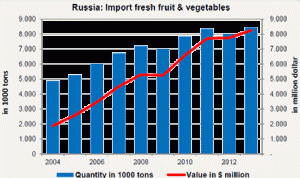The Russian Ministry of Agriculture has estimated that this year will be a 10-year record with regard to the vegetable harvest. The Ministry Press Service stated that by the end of 2018, Russia will produce one million MT of greenhouse vegetables. This will be an increase of 12.3 percent compared to last year, Izvestia reported.
The increase in yields, as stated by the Ministry of Agriculture, is linked to the introduction of new and modernized winter greenhouses. This was made possible by investments, credits and the reimbursement of their construction costs by the state.
Experts believe that a bumper harvest will not affect the prices of the domestic products. The Ministry of Agriculture plans to increase the production of greenhouse vegetables to 1.5 million MT by 2024.
As of October 30, 2018, the gross yield of greenhouse vegetable crops in Russia amounted to 820.1 thousand tons, which is 25.7% more than in the same period of 2017. This has been reported by the press service of the Ministry of Agriculture of the Russian Federation, according to “APK-Inform: vegetables and fruits.”
The Ministry’s report reveals that the cucumber production reached 496.8 thousand tons by October 30, which is 15% more than on the same date of the previous year. At the same time, the tomato production exceeded last year’s figures by 47% and amounted to 310 thousand tons. Lastly, the production volume of the remaining vegetable crops reached 13 thousand tons, and this is 30% more than on the same date a year ago.
